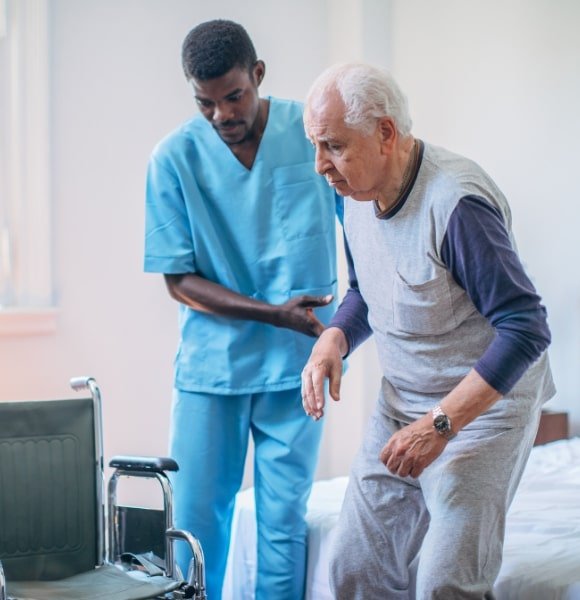What is the Difference Between Home Health & Hospice Care?
The leading provider of hospice care services, Salmon Valley Hospice provides end-of-life care wherever patients want to receive it. We often get asked how home health compares to hospice services.
Contact Us Anytime, 7 days a Week
Contact Info
Salmon, ID 83467
Counties we serve
Open Hours
Regular Office Hours:
Sat & Sun: Closed
Outside office hours, you may reach out through call anytime 24/7
Similarities between Hospice and Home Health Care
Hospice and home health care share some similarities, but the two approaches to care address, distinct patients, with unique needs. Hospice care is given to patients with an advanced illness when curative medical treatments are no longer effective. Home health care helps people recover from injury or progress toward improved functionality.
If you’re unsure about the kind of care that’s most appropriate for your patient, learn more about the differences between hospice services and home health care below.
Hospice
Our hospice care service takes place at the patient’s private residence. Daily care is provided by a family caregiver (or friend) and supported by an interdisciplinary team of experts: nurse, aide, physician, physical therapist, chaplain, social worker, volunteer, bereavement counselor with additional specialists stepping in to help as necessary. All of these teams specialize in compassionate end-of-life comfort measures & support.
Hospice services include:
- delivery of medications, equipment and supplies to manage a patient’s hospice diagnosis at no cost;
- It’s not just 24/7 expert advice, it’s actual emergency care all around too.
- spiritual and psychosocial support including help with funeral arrangements, bereavement counseling benefits.
You or your loved one may be eligible for hospice care, if you notice the following signs:
- Loss of appetite
- Sudden weight loss after a period of stable eating habits.
- Difficulty breathing, shortness in breath despite medications to help with pulmonary issues.
- Palliative Performance score of 50 or less based upon the following assessment: unable to do any physical activity, spend most or all of your time in a chair or bed, need significant help for care and are increasingly drowsy, confused
- Increased reliance on others for help with personal care, including bathing, dressing, use of the bathroom and feeding
- A decline in mental alertness, memory and thinking abilities
Home Health
Home health care services are brought to patients who require intermittent skilled nursing, physical therapy, speech-language pathology or continued occupational services. Home health care is documented through progress reports for the patient’s doctor.
In home health care, a patient must be at least partially confined to their house in order for Medicare benefits. Generally this is because the treatment plan involves reducing dependence on hospitalization or rehabilitation after surgery or an injury. The duration of these services depend on what’s included with that particular patient’s insurance and how they are doing medically overall.
While hospice patients have zero out-of-pocket expenses related to their terminal diagnosis, home health care patients may be required to pay for medications, supplies and equipment. Home health care services do not cover inpatient stays if symptoms escalate and become unmanageable at home. However family caregivers of a patient receiving treatment from these resources receive training education to enhance patient rehabilitation.
FAQ Comparison Between Hospice and Home Health Care
Who provides care?
Hospice: A patient receives hospice services from a Medicare-certified hospice organization. They provide an interdisciplinary team to come to their home, wherever they call home: private residence, assisted living community, or nursing homes.
Home Health: Home health agencies visit private homes to treat patients with diagnoses, employing nurses, certified nursing assistants (CNAs), speech therapists, and occupational therapists.
How long is care provided?
Hospice: The hospice program allows a patient to receive unlimited care for six months or more, as long as the physician determines that their life expectancy is limited.
Home Health: Home health care is dependent on the goals of treatment. The amount, frequency and time period of those services must be reasonable as well as it should improve or maintain a person’s condition through therapy.
Is care only available to homebound patients?
Hospice: A patient can leave home and do errands on a hospice program. They could even go for a walk, take some fresh air if they feel up to it while still under the care of their nurse or doctor.
Home Health: Separate health and care again here and anywhere where this is stated.
Do they provide care 24/7?
Hospice: Hospice provides nursing and hospice aide services as needed for patients. 24 hour care is available under certain circumstances.
Home Health: Home health care is only covered by Medicare for general care and not round-the-clock assistance.
What if the patient’s symptoms cannot be controlled at home?
Hospice: Inpatient care is an option for hospice patients who need a short-term stay in the hospital to get their symptoms under control before returning home.
Home Health: When patients need inpatient care, home health agencies do not follow them to the hospital and skilled nursing facilities.
Can a patient receive Home Health Care and Hospice Care at the same time?
Patients can receive both services if they meet eligibility for both programs.
Compare Utah Home Health vs Utah Hospice
| Benefits/Eligibility Requirements | Home Health | Hospice |
|---|---|---|
| Location of Treatment | Provided in the home or assisted living facility | Provided in the home, skilled nursing facility, or assisted living facility |
| Basic Eligibility | Skilled medical need (e.g., nursing, physical therapy, etc.), doctor's order. | Doctor certifies a terminal diagnosis with a prognosis of 6 months or less to live. |
| Homebound Status | Must be homebound | Does not have to be homebound |
| Nursing | 24-hour availability | 24-hour availability |
| Physical Therapy | Yes | Limited |
| Speech Therapy | Yes | No |
| Medical Social Services | Yes | Yes |
| Occupational Therapy | Yes | Limited |
| Aid and Homemaking | Yes | Yes |
| Dietitian | Yes | No |
| Massage Therapy | No | Yes |
| Music Therapy | No | Yes |
| Spiritual Care | No | Yes |
| Bereavement Follow-Up | No | Yes |
| Telehealth Services | Yes | No |
| Durable Medical Equipment | Covered through Medicare at 80\%, or through most insurance plans | Covered 100\% |
| Medications Specifically Related to Patient's Diagnosis | Covered through patient's Medicare Part D, if the patient has this | Covered 100\% |
| Animal Assisted Therapy | No | Yes |
| Wound Care | Yes | Yes |
| Volunteer Services | No | Yes |
| Treatment Approach | Treat condition to help patient become independent | Comfort measures only and allow natural processes to occur |

Send us a Message

Location
Salmon, ID 83467

Call Us Today
(208) 993 8050




